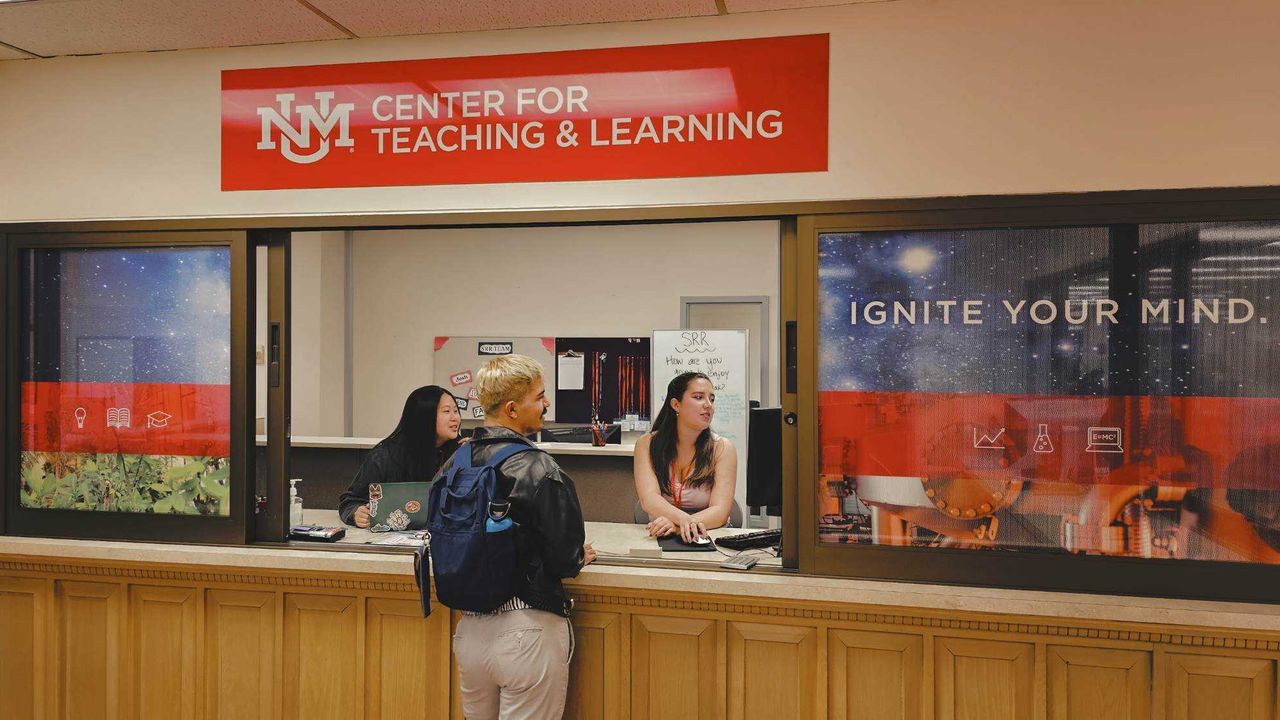The University of New Mexico has a whole part of campus filled with dedicated, expert tutors–and that’s certified.
UNM’s Center for Teaching and Learning (CTL) was just awarded designation as a Level 3 certified tutor training program by the College Reading and Learning Association (CRLA). That’s also known as a master-level certification, the highest possible achievement.
“The certification allows us to say that our training program is robust, that it meets all of the requirements,” Director of Student Learning Assistance at CTL Stephanie Sánchez said. “At times it even surpasses those requirements, and so we can very proudly say that most of our tutors at the moment are master tutors.”
The CTL has evolved over time, after it joined a 40 year legacy of providing crucial campus resources. It officially became established as part of UNM’s undergraduate tutoring program (CAPS) during a merge in 2015.
“We realized that we have the same goal at the Center for Teaching and Learning, and that is whether we're supporting students or supporting instructors, our goal is to have better student learning. We want to help the people on both sides of the classroom,” CTL Executive Director Aeron Haynie said.

Now, eight years later, CTL has expanded to include Graduate Support and the Center for Digital Learning. With all of the services, and especially tutoring, it’s not a one size fits all approach.
“I think the other thing that is really special about our Center and our training program is the focus on educational equity,” Sánchez said. “It’s understanding that students come from a variety of educational backgrounds and levels of preparedness for college, and recognizing that it does not reflect on someone's intelligence or abilities. It really is a matter of how we provide students with the different skills that they need to reach their individual educational goals.”
Still, CTL’s tutoring is a large part of what keeps students of all levels coming back. Tutoring is also what snagged the CRLA’s attention when the CTL first applied for Level 1 and Level 2 certification.
“Tutoring is by far our most popular service. Our tutors are really good at asking students questions, helping them set goals for that session and understanding where the student is coming from so that they can structure that tutoring session in an individual sort of way,” Sánchez said.
It’s a testament to the quality tutoring the CTL provides. Between learning strategies, language support and STEM-embedded, course-based practices, it’s not your regular tutoring center.
“It is important that people understand tutoring isn't something you can just slide into,” Sánchez said. “Working with different humans requires training and understanding. Our tutors work with so many different students in so many different ways, so we focus quite a bit on the best practices of tutoring. Tutoring is different in some ways than teaching.”
Actually earning the certification is a long-term process, which takes rigorous qualifications, testing and requirements. That, plus hundreds of hours of tutoring services. Only a few tutoring institutions reach that Level 3 status.
“Across the University of New Mexico campus, there are different tutoring programs, but we are the only one that is nationally accredited,” Haynie said. “We are certified, which means that we've had to actually base our tutoring on research that's developed by experts in learning standards internationally, and we're held to these standards.”
That’s also a huge credit to the students who guide the learners.
“I think it's really powerful that we don't just provide jobs. These are positions that will look very good on your resume, whatever the student ends up doing. We also provide a real professionalization, so students working as tutors really learn their material,” Haynie said. “This is a really wonderful high-impact practice, meaning this is really making an impact not just on the students who need the tutoring, but also the students who work as tutors themselves. I think it's the best on-campus job around.”
In the end, it’s a mutually beneficial relationship between the Center, the tutor and the student. A Lobo gets the academic help they need, the tutor gets payment and experience, and both the tutor and the Center get a top-notch certification to display.
“Evidence-based practices around teaching, as well as the social and emotional aspects of learning–those are things that we focus on quite a bit and our certification speaks to that,” Sánchez said. “We put in a lot of time and our students put in a lot of time. We expect a lot from them. We want to acknowledge all of their work by also providing them with a high-quality professional experience.”
Beyond its strong grip in the tutoring world, both Sánchez and Haynie want the campus community to know resources are available far beyond.
That includes assistance in dissertation coaching, writing boot camps, and even lesson improvement and online adaptations for faculty and staff.
“Believe it or not, they need help as well as everyone else. They need support,” Haynie said.
Beyond that, those behind the Center think it’s a good thing when their services are no longer required.
“It’s about ensuring that students are learning when they come into our space, that they are feeling more comfortable with materials and more confident,” Sánchez said. “Ultimately we want those students to be able to leave our space and be outside of the classroom and feel confident working on those problems, homework assignments, whatever it may be, without our support.”
This certification will last for another four years. Find out about all the assistance that awaits at the Center for Teaching and Learning.
